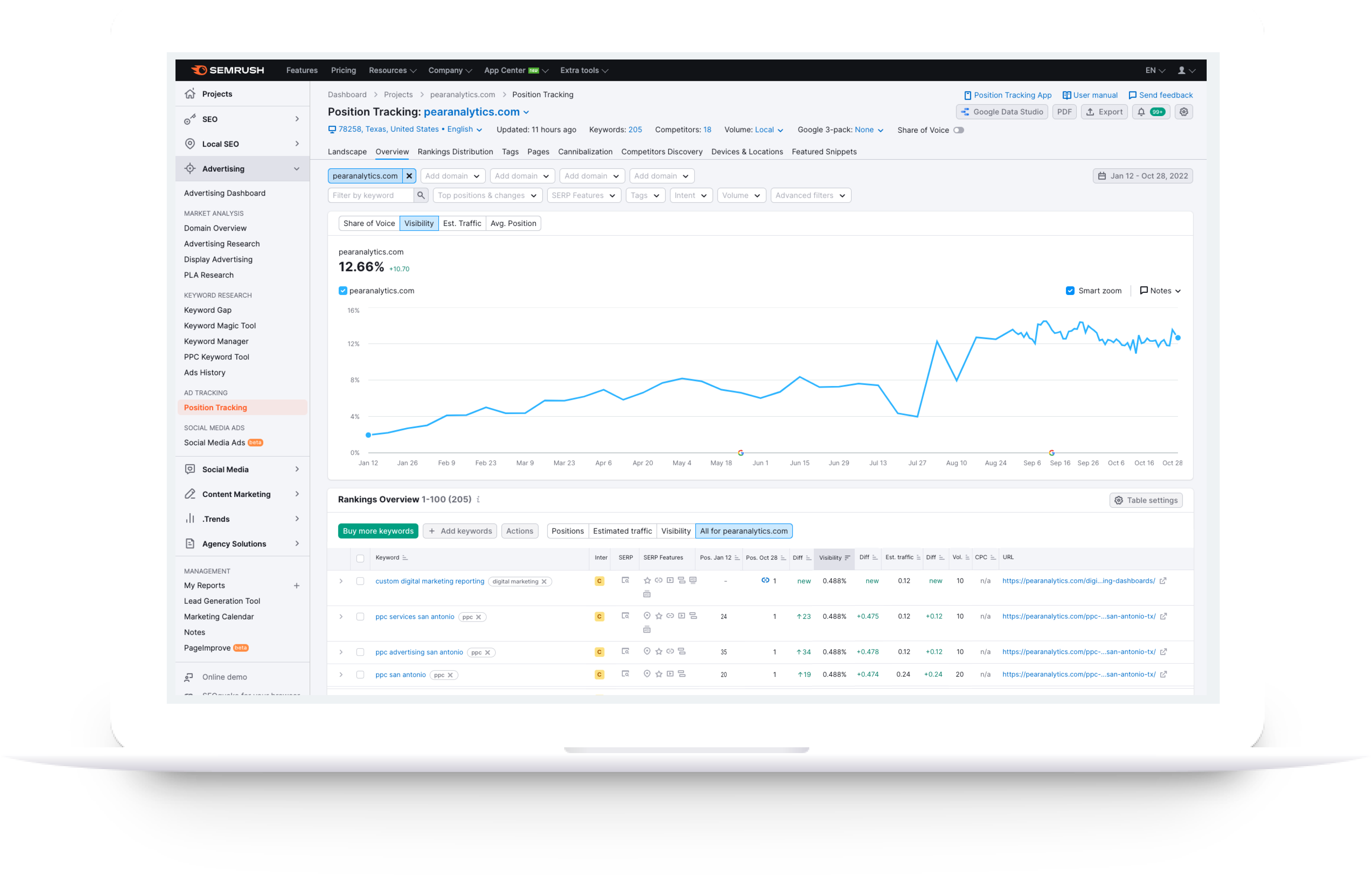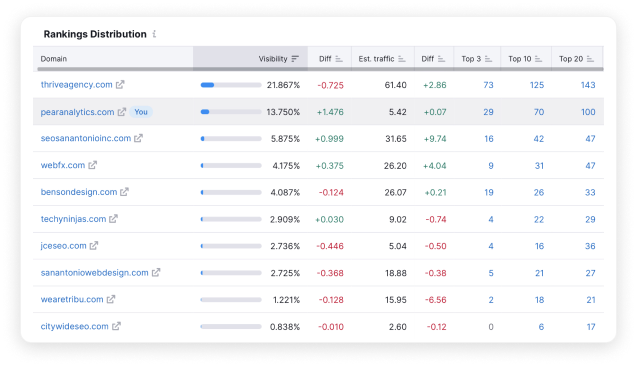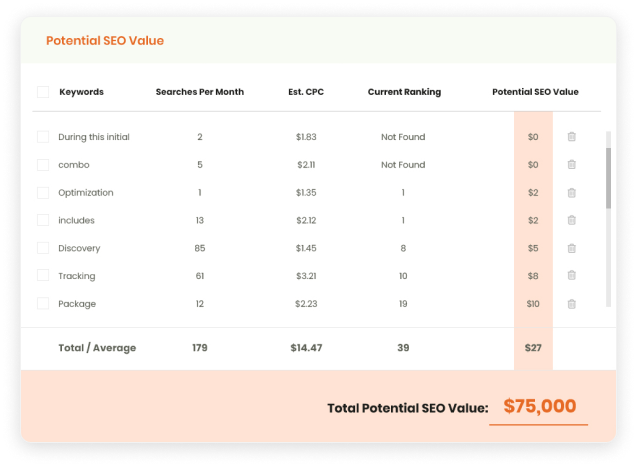Nearly every client wants to know: “How will I know that your SEO efforts are working?” So we strived to answer that question beyond the normal, volatile metrics you always hear about.

SEO Success Metrics
Well-structured SEO campaigns must be data driven and measure success through these metrics. Each of these SEO success metrics provides valuable insights into how well your SEO campaign is performing and where improvements can be made. Without SEO success metrics, it would be impossible to gauge the effectiveness of your SEO campaign and determine where changes need to be made.
Rankings
One of the most obvious indicators of SEO success is how well your website is ranking in search engine results pages (SERPs). If your goal is to rank for certain keywords, then you should track your rankings over time to see if your SEO efforts are paying off.
Traffic
Another key metric is website traffic. This can be measured in terms of overall traffic growth, as well as specific traffic channels (e.g., organic search, direct, referral, etc.). Obviously, you want to see an increase in overall website traffic as a result of your SEO efforts. But it’s also helpful to break down traffic by channel so you can see which ones are performing the best.
Non-Branded Words
If people are finding your website with keywords that are not brand name, it’s a good sign that you’re making progress with your SEO efforts. Non-brand searches can also lead to increased traffic and conversions, so they’re definitely worth monitoring.
Total Keywords Found
Our tools can monitor over time the total number of keywords that your domain is ranking for in the top 100 positions. This is a great metric to not only see your own growth, but to see what other competitors rank for.
But at Pear Analytics, we want to go beyond the normal SEO metrics that everyone uses. In addition to these, we have developed two additional key metrics that can help determine the success of a campaign:
Visibility Score
This is a new metric we like to use for progress because we can group themes of keywords together, and see how the collective group of keywords is performing against a wide variety of competitors. The Visibility index is based on the click-through rate (CTR) that shows a website’s progress in Google’s top 100 for keywords from the current tracking campaign.

SEO Value
This metric help you understand the ROI of your campaign performance in a different way by using the dollar value of each visitor. We look at what it would cost to acquire that visitor from paid ads and then using your current ranking and click-through rate for that position, we’re able to see your Current and Potential SEO value over time as rankings improve.

Winning SEO strategies that deliver long term results!
Let us help you navigate the endless supply of paid media options now available to your business.
Other Important SEO Metrics
Organic Traffic
Organic traffic is one of the most important SEO metrics because it represents the number of visitors who come to your site as a result of organic search results. This means that they typed in a relevant keyword or phrase into a search engine and your site was one of the results that came up. This is different from paid traffic, which is when you pay for advertising in order to get people to visit your site. organic traffic is important because it shows that your site is relevant to the keywords that people are searching for, and that you’re attracting visitors who are actually interested in what you have to offer. This can lead to higher conversion rates, and ultimately, more sales. organic traffic is also important for SEO purposes because it can help to improve your ranking in search engine results pages (SERPs). The more organic traffic you have, the higher you’re likely to rank, and the more likely people are to click on your listing when they see it in the SERPs. Therefore, organic traffic is an important metric to track if you want to improve your SEO and get more organic traffic coming to your site.
Rank Tracking
Any good SEO campaign should involve regular rank tracking. This is the process of monitoring your website’s position in the search engine results pages (SERPs) for certain keywords. Rank tracking can tell you a lot about the progress of your SEO campaign, and it can be used to identify areas where you need to make improvements. For example, if you’re rank tracking for the keyword “cat food,” you might notice that your website ranks well for that keyword on Google but not on Bing. This could be an indication that you need to do more work to optimize your site for Bing. rank tracking can also give you insights into which of your keywords are most important. If you see that a certain keyword has a high rank but low search volume, it might not be worth optimizing your site for that keyword. On the other hand, if you see that a keyword has a low rank but high search volume, it could be worth targeting that keyword more aggressively. Either way, rank tracking is an essential tool for any SEO campaign.
Number of Backlinks
Because search engines like Google use backlinks as a sign of the quality and popularity of a website, it’s natural to think that the more backlinks you have, the better your site will rank. However, this is not always the case. In fact, having too many backlinks can actually hurt your site’s SEO metrics. This is because search engines view backlinks from low-quality sites as spam. So, if you have a lot of backlinks from these types of sites, it can actually drag down your overall SEO metrics. That’s why it’s important to focus on quality over quantity when it comes to backlinks. It’s also worth noting that the number of backlinks isn’t the only factor that determines your site’s SEO metrics. Other factors, such as the quality of your content and your site’s overall authority, are also important.
Engagement Metrics
Engagement metrics are a major factor in SEO success because they show how users interact with your website. Examples of engagement metrics include time on site, pages per session, and bounce rate. These metrics are important because they show how well your website is holding users’ attention. If users are quickly leaving your site, it’s an indication that they didn’t find what they were looking for or that your website wasn’t relevant to their needs. On the other hand, if users are spending a lot of time on your site, it’s an indication that they’re finding your content useful and engaging. In order to improve your SEO, you need to focus on improving your engagement metrics. This can be done by creating more relevant and user-friendly content, improving your website design, and making sure that your website is accessible from all devices. By improving your engagement metrics, you’ll ultimately be able to improve your SEO and get more traffic to your website.
Page Speed
Page speed, or page load time, is often overlooked as a key SEO metric, but it’s actually very important. search engines take page speed into account when ranking websites, so a slow site can hurt your visibility. In addition, page speed is a major factor in user experience. If your site is slow, visitors are likely to bounce back to the search results, instead of sticking around and exploring your content. That’s why it’s so important to make sure your site loads quickly. There are a few things you can do to improve your page speed, such as optimizing images and using caching. By taking these steps, you can ensure that your site is fast and responsive, which will boost your SEO and improve the user experience.
Domain Authority
Domain authority is one of the most important metrics for SEO. It is a number from 0 to 100 that indicates how much authority a domain has. The higher the domain authority, the better the chance of ranking high in search engine results pages (SERPs). Domain authority is based on many factors, including age, popularity, and link profile. The biggest factor is linking domain authorities. This means that if you have a lot of high-quality links from other domains with high domain authority, your domain authority will be higher. So, how does domain authority relate to important SEO metrics? Well, domain authority is one of the most important factors in determining your SERP position. If you want to rank high in SERPs, you need to have a high domain authority. Fortunately, there are a few things you can do to increase your domain authority. One is to get links from other high-quality domains. You can also improve your own link profile by getting rid of low-quality links and adding new, high-quality ones. Finally, you can make sure your website is popular and relevant by regularly creating new content and promoting it on social media. If you do all of these things, you should see your domain authority increase over time, which will result in better SEO performance.
Indexed Pages
Indexed pages are pages that a search engine has found and indexed. They are the pages that appear in search results. The number of indexed pages is an important SEO metric because it indicates how much of your website is being indexed by a search engine. The more indexed pages you have, the more likely it is that people will find your website when they search for keywords related to your business. There are a number of ways to improve the number of indexed pages, including optimizing your website for specific keywords and building backlinks. Indexed pages are an important part of SEO, and improving your indexation can lead to better search engine rankings and more traffic to your website.
Google Analytics
Google Analytics is a powerful tool that provides valuable insights into website traffic and performance. However, many people are not aware of how it can be used to improve SEO. One of the most important SEO metrics is keyword ranking. By tracking the keywords that users are searching for, you can identify which keywords are most important for your website. Using Google Analytics you can evaluate your top landing pages by traffic, which is an indication of what keywords could be performing well. This information can be used to fine-tune your SEO strategy and ensure that your website is appearing in the most relevant search results. In addition, Google Analytics can also be used to track other important metrics such as conversion rate and bounce rate. By understanding how these metrics relate to each other, you can identify areas where your website needs improvement. Ultimately, Google Analytics is an essential tool for any website that wants to rank highly in the search results.
Google Search Console
Google Search Console is a webmaster tool provided by Google that helps website owners track their website’s performance in Google search results. It also provides data and insights that can be used to improve a website’s SEO. One of the most important metrics that google search console tracks is click-through rate (CTR). CTR is a measure of how often people who see your website in Google search results click on it. A high CTR indicates that your website is relevant and trustworthy, and that searchers are finding what they’re looking for on your site. Improving your CTR can have a significant impact on your website’s traffic and search visibility. Another important metric tracked by GSC is average position. This metric measures where your website appears in Google search results, on average. A high average position indicates that your website is ranking well for its target keywords. improving your average position can be difficult, but it can result in more traffic to your website from Google search. Another metric in GSC is crawl errors. You can evaluate how Google sees your website, and what crawl issues they are having when accessing the site through the crawl stats report, such as 404 errors, server errors, pages blocked by robots.txt and more.



